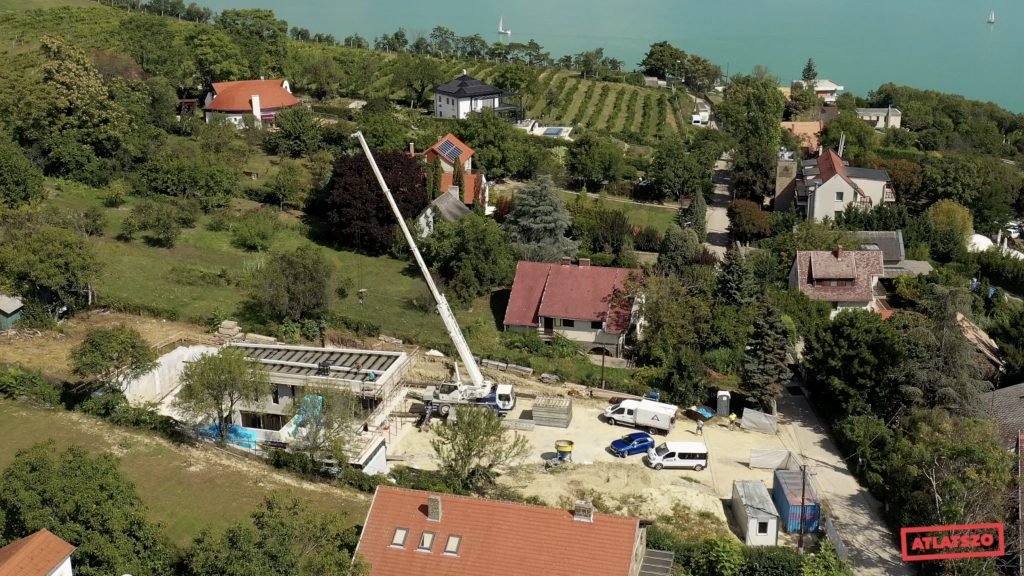The https://english.atlatszo.hu use cookies to track and profile customers such as action tags and pixel tracking on our website to assist our marketing. On our website we use technical, analytical, marketing and preference cookies. These are necessary for our site to work properly and to give us inforamation about how our site is used. See Cookies Policy
Luxury villas and pools in the protected area – illegal construction on the rise at the Tihany Peninsula
Hungary’s first nature reserve was established here in 1952. It is part of the Balaton Uplands National Park, a Natura 2000 nature conservation area, a World Heritage site – yet the Tihany Peninsula is being built in at a rapid pace. Construction sites are restricted by strict rules on paper in this exceptional location, but these restrictions do not seem to apply to everyone. The area has become extremely popular with the governing elite: our camera drone recordings show what the Tihany Peninsula looks like now, how many luxury cottages disguised as agricultural storages, and swimming pools licensed as water reservoirs have been built here.

“The entire area of the Tihany Peninsula is part of the Balaton Uplands National Park. The first nature reserve in Hungary was established on the Tihany Peninsula in 1952”- says an environmental study commissioned by the municipality of Tihany in 2017. The peninsula is also a Natura 2000 site and is protected as well as a wetland by the Ramsar Convention.
Moreover, with its rare spring cones and geyser field, referring to the former volcanic activity, Tihany was awarded an Europe Diploma: this award places protected areas under the auspices of the Council of Europe whose geological, biological or landscape diversity is outstanding in Europe. In addition, the Tihany Peninsula is a World Heritage candidate site as part of the “Balaton Uplands Cultural Landscape”.
However, it seems that this multiple protection is not enough to relieve the special landscape of Lake Balaton from the luxury investments that place a heavy burden on the environment.
Several articles published this year in the Hungarian press detail how parts of the hillside are taken away to erect luxury cotages disguised as „agricultural storage” buildings and how private swimming pools that are not otherwise allowed in Tihany are disguised as rainwater reservoirs or garden ponds. The richest Hungarian businessman and childhood friend of PM Viktor Orbán also bought an orchard in Tihany this year for more than half a billion forints, on which there is a “farm building” that looks exactly like a luxury holiday home.
Atlatszo reporters visited the site in September: we wittnessed a house being built on the protected peninsula with a huge crane, and got tired counting the number of luxury villas and swimming pools visible only from the air when we flew our camera drone over the protected area.
Luxusvillák, medencék, óriásdaru a természetvédelmi területen – így épül be a Tihanyi-félsziget from atlatszo.hu on Vimeo.
An opposition MP, Olivio Kocsis-Cake filed a police complaint in July against property owners circumventing the rules on construction in Tihany. The politician argued that some of the owners utilized false documents to report certain constructions, that they lied to the authority about what they were actually building, describing their future holiday home as an agricultural building.
Kocsis-Cake found out that since 1st March 2020, 35 construction inspections have been carried out in the settlement, and proceedings have been initiated in six construction sites in Tihany. In one of these cases, the owner was obliged to demolish, while in five other construction sites, the parties had to apply for a proper permit.
Earlier, in response to the questions of Kocsis-Cake, Balázs Orbán, a State Secretary of the Prime Minister’s Office, stated: the Veszprém County Government Office “pays special attention to the developments in Tihany due to the special features of the village and the nature of protected areas”; and that in the government’s view, „many new protected natural areas of national importance” have been established in recent years.
“The loosening of the construction law favors the offenders because most construction sites no longer need to apply for a construction permit. Furthermore, since 2015, construction supervision is no longer the responsibility of the local government, but of the county government office, far from the locality. By the time the legal action against illegal construction reaches the stage of substantive action, the trees have been cut down, the hill was cleared, and a swimming pool classified as a water reservoir has been completed. The illegal structures will not be demolished, the offending investor can be obliged to pay a fine. However, no matter how much is this amount, the trees can no longer be revived, and the ruined landscape will remain with us for decades”- Adrienne Hajósy, program manager of the Women for Lake Balaton Association, told Atlatszo about the situation in Tihany.
Written by Gabriella Horn, click here for the Hungarian version of this article. Camera drone recording: Dániel Németh.


